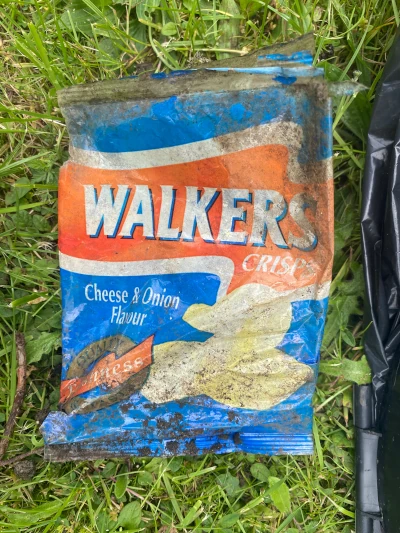
As part of the RECOUP Litter Composition & Pathways Project a team from the independent advisory body recently carried out a litter pick in a local industrial area. In total 7 bags were collected over a 2-hour period which incorporated a mixture of new material as well as legacy litter, and remarkably included a crisp packet with a 1997 expiry date!
The condition of this crisp packet was surprisingly preserved, with little degradation to the packet itself or the ink, really highlighting how litter can stay in the environment for considerable periods of time if disposed of incorrectly and left uncollected.
This was the 5th litter pick carried out as part of the project, which came about due to the continued concern over litter pollution, and the call for better data and evidence to drive effective solutions to reduce litter.
Supported by funding from RECOUP members McDonald’s and Ocado Retail, the project’s primary goal is to review, challenge, and provide robust evidence regarding the composition of litter. To achieve this, RECOUP aims to:
- Develop a standardized, evidence-based methodology for collecting and analysing litter.
- Create a comprehensive litter composition data set.
- Test the use of Artificial Intelligence technology to determine insights such as litter distribution and composition.
- Understand the difference between terrestrial and riverine litter through the use of a Seabin, which is additionally funded by Viridor and Peterborough Environment City Trust (PECT).
A variety of litter picks have already been carried out across the Peterborough area with the help of the Peterborough Litter Wombles, covering a mix of location types and deprivation levels, to understand any variations in litter types based on these variables.
As the project progresses, the methodology will be shared with litter groups across the country, with the aim for them to continue building the litter database by covering a larger variety of different location types, helping to make the data as comprehensive and inclusive as possible.
The evidence-based insights gained from this project will aid in the development of targeted interventions to combat litter pollution effectively and will be shared with government, devolved administrations, and key stakeholders to inform and advise policy decisions.
Laura Hutchings, Projects & Data Manager at RECOUP, said “It has been really interesting to see the variety of both new and legacy litter we have been collecting from each litter pick. There is an obvious need for highly thought-out, targeted interventions for the prevention of litter, and this project will provide key data and insights to help achieve this”.
If you would like to find out more about the Litter Composition & Pathways Project, please contact Laura Hutchings on laura.hutchings@recoup.org.






